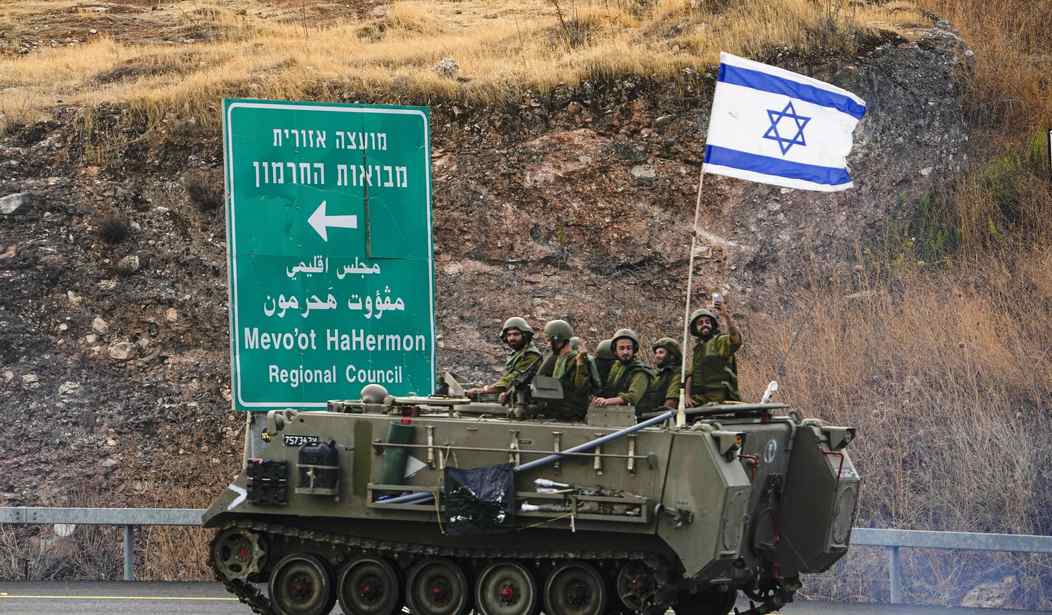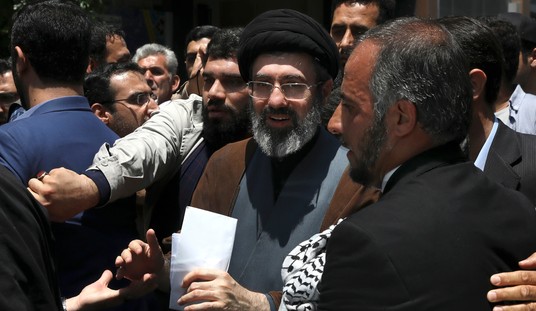Reports from the past couple of days left some ambiguity over Israel's next steps after eliminating Hassan Nasrallah and Hezbollah's leadership. Some thought that Benjamin Netanyahu and the cabinet might wait to see what impact that had on enemy recalculations. Instead, the IDF has followed up on their clear military advantage by conducting ground operations in Lebanon, seeking to destroy Hezbollah capabilities and force them to flee.
How do we know this? Because the Biden-Harris administration has a big mouth, that's how, although it wouldn't have been a secret for long anyway:
IDF soldiers entered southern Lebanon as part of a ground assault on Monday night as the conflict with Hezbollah continues to escalate, AFP reported.
Shortly thereafter, Arabic media such as Al-Jazeera and MTV Lebanon claimed that IDF tanks had entered multiple villages in southern Lebanon.
"This is what they have informed us that they are currently conducting, which are limited operations targeting Hezbollah infrastructure near the border," US State Department Spokesperson Matthew Miller said to the press on Monday, according to AFP.
That angered Israeli cabinet ministers, who decided to loop in their US counterparts after complaints about being left in the dark on the Nasrallah operation:
Hebrew media reports say that the security cabinet has approved the next phase of the war against Hezbollah in Lebanon, presumably the much-touted ground offensive.
The Ynet news site reports that during the discussion, some ministers decried leaks about the operation from American officials after they were updated by Israel.
That leak didn't seem accidental, either. During the consultation between the two governments, Axios reports, Joe Biden and his team pushed back on Israeli plans. Supposedly, the invasion would lend support to Hezbollah:
The Biden Administration understands the strategic purpose of the ground operation and the need to make sure Hezbollah cannot maintain the capacity to attack Israeli communities from the immediate opposite side of the border, the sources said.
- But White House officials told their Israeli counterparts they're concerned that — as in previous wars in Lebanon — what starts as a time-limited and geographically limited operation slides into something larger and longer-term, the source said.
- The Biden administration has also privately warned that an invasion will increase support for Hezbollah among ordinary Lebanese people, U.S. officials say.
Biden didn't win the argument, clearly. The context of Barak Ravid's report makes it look like the leak got ordered as a kind of rebuke. It certainly won't convince the Israelis to keep Biden-Harris officials in the loop on future plans.
In the short run, that concern hasn't exactly played out, to which we'll return in the end. First, the IDF's initial assessment from covert ground operations prior to the invasion offers an optimistic view for Israel as it readies a boots-on-ground "new phase." The full-scale attacks over the last two weeks apparently did more damage than the IDF thought:
Senior IDF sources have been extremely surprised at how ineffective Hezbollah has been at responding to the military's onslaught against it over the last two weeks and in particular since Hezbollah chief Hassan Nasrallah was assassinated this past Friday.
They also said as recently as Sunday night that a significant majority of Hezbollah's capability to retaliate on the Israeli home front has been harmed and makes it far more reduced than might have been expected.
Hezbollah claims it can handle any IDF invasion in southern Lebanon. They performed surprisingly well in 2006, Yonah Jeremy Bob reminds readers in the Jerusalem Post, and that was without the drone technology that both sides use to great effect. However, the IDF just finished conducting a similar ground war in Gaza and has a much better grasp on combined-arms operations to counter those threats. Plus, Hezbollah had an intact command structure in 2006 and the ability to coordinate attacks and move materiel on the battlefield. Those two capabilities may no longer exist within Hezbollah, even with their tunnel networks -- which is the obvious priority for the IDF anyway.
Plus, the IDF continues to attack Hezbollah's remaining command-control assets in Beirut:
At least two Israeli strikes hit Beirut's southern suburbs late on Monday, a security source said, with Reuters reporters seeing two flashes of light and hearing loud blasts coming from the neighborhood.
The Israeli military had warned an hour earlier that it would strike specific buildings in the typically densely populated southern suburbs, saying armed group Hezbollah was using them as facilities and telling residents to leave.
That brings us to Lebanon's response. Previously, Hezbollah and Lebanon's armed forces coordinated defense plans for the blue line. Now, however, Lebanon's army has pulled back three miles, leaving Hezbollah alone to face the IDF:
Lebanese troops have pulled back from positions along Lebanon’s southern border with Israel to at least five kilometers (some three miles) north of the frontier, a Lebanese security source tells Reuters. ...
The Lebanese army is “repositioning and regrouping forces” at the southern border following threats of an Israeli incursion against Hezbollah targets, the official says, requesting anonymity to discuss sensitive matters.
That sends a big signal about the level of damage to Hezbollah in Lebanese politics. The Lebanese are no fans of Israel, but they have been under the thumb of Iran via Hezbollah for two decades. If they perceived strength in Hezbollah and Iran, the Lebanese army would likely remain on the front lines for a coordinated defense. Now it looks like the Lebanese are leaving Hezbollah to twist in the wind.
And late today, Lebanon's prime minister Najib Mikati offered to finally enforce UN Security Resolution 1701 and demilitarize the sub-Litani. Hezbollah had refused to allow that for the last eighteen years, and Lebanon didn't fight them to force compliance, but things have clearly changed:
Earlier in the day, in an apparent effort to stave off a ground incursion, Lebanon’s caretaker Prime Minister Najib Mikati said the Lebanese government was ready to fully implement a 2006 UN Security Council resolution that had aimed to end Hezbollah’s armed presence south of the Litani River.
“We in Lebanon are ready to implement [Resolution] 1701, and immediately upon the implementation of the ceasefire, Lebanon is ready to send the Lebanese army to the area south of the Litani River and to carry out its full duties,” in coordination with UN peacemakers, Mikati said.
Hezbollah was barred under the resolution from maintaining a military presence south of the Litani. However, it has openly violated that resolution for long years, with both the Lebanese army and UN peacekeepers taking no action on the matter.
Mikati did not say he had reached any agreement with Hezbollah on adhering to the resolution, and it was not clear how he proposed to implement it without use of force against the militia that effectively controls southern Lebanon.
The Israelis will view that pledge with a great deal of skepticism, as they should. If Hezbollah regains its strength, it will force the Lebanese government back into submission. Mikati knows that too, which is probably the reason he ordered the Lebanese army to pull back and leave Hezbollah exposed. He can let the Israelis take care of the problem and negotiate afterward.








Join the conversation as a VIP Member